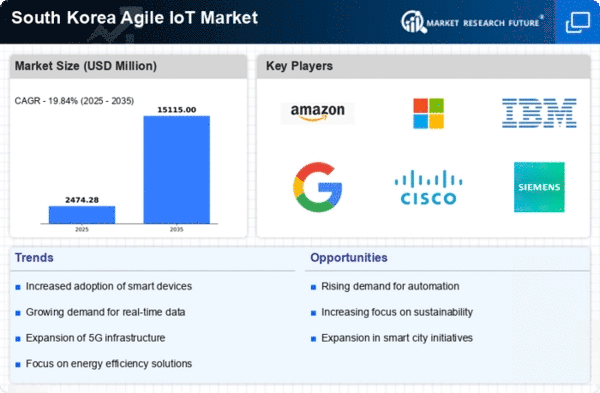Expansion of 5G Infrastructure
The rollout of 5G infrastructure in South Korea is poised to significantly impact the agile iot market. With its promise of ultra-fast connectivity and low latency, 5G technology enables a new wave of IoT applications that require real-time data transmission. This advancement is particularly relevant for industries such as autonomous vehicles and smart manufacturing, where seamless communication between devices is essential. Current projections suggest that the 5G market in South Korea could reach $5 billion by 2027, indicating a robust investment in this technology. The expansion of 5G networks is likely to facilitate the deployment of agile iot solutions, allowing businesses to leverage the full potential of IoT devices. As connectivity improves, the agile iot market is expected to flourish, driven by innovations that capitalize on the capabilities of 5G technology.
Government Initiatives and Support
The South Korean government plays a pivotal role in fostering the agile iot market through various initiatives and support programs. With a strategic focus on enhancing the nation's technological infrastructure, the government has allocated substantial funding to promote IoT innovation. Recent reports indicate that public investment in IoT technologies is expected to reach $1 billion by 2026, aimed at bolstering research and development. This support not only encourages startups and established companies to explore agile iot solutions but also creates a conducive environment for collaboration between public and private sectors. Furthermore, government policies aimed at standardizing IoT protocols are likely to enhance interoperability among devices, thereby accelerating the adoption of agile methodologies. Such initiatives are crucial for positioning South Korea as a leader in the agile iot market, fostering a vibrant ecosystem that nurtures innovation and growth.
Integration of Artificial Intelligence
The integration of artificial intelligence (AI) into the agile iot market is transforming how businesses operate in South Korea. AI technologies enhance the capabilities of IoT devices, enabling them to learn from data and make autonomous decisions. This synergy is particularly beneficial in sectors such as healthcare and smart cities, where predictive analytics can optimize resource allocation and improve service delivery. Recent studies suggest that the AI market in South Korea is projected to grow by 30% annually, which could significantly impact the agile iot market. As companies increasingly adopt AI-driven solutions, the demand for agile methodologies that support rapid deployment and iteration is likely to rise. This integration not only streamlines operations but also enhances the overall user experience, making it a critical driver for growth in the agile iot market.
Rising Demand for Real-Time Data Processing
The agile iot market in South Korea experiences a notable surge in demand for real-time data processing capabilities. As industries increasingly rely on instantaneous data for decision-making, the need for agile solutions becomes paramount. This trend is particularly evident in sectors such as manufacturing and logistics, where operational efficiency hinges on timely information. According to recent statistics, the market for real-time data analytics is projected to grow by approximately 25% annually, indicating a robust appetite for agile iot solutions that can facilitate rapid data processing. Companies are investing heavily in technologies that enable seamless integration of IoT devices, thereby enhancing their ability to respond to market changes swiftly. This rising demand for real-time insights is likely to drive innovation and competition within the agile iot market, compelling businesses to adopt more agile methodologies to stay ahead.
Focus on Sustainability and Energy Efficiency
Sustainability has emerged as a crucial driver in the agile iot market, particularly in South Korea, where environmental concerns are at the forefront of public discourse. Companies are increasingly adopting IoT solutions that promote energy efficiency and reduce carbon footprints. The agile iot market is witnessing a shift towards technologies that enable smart energy management, such as smart grids and connected devices that optimize energy consumption. Recent data indicates that the market for energy-efficient IoT solutions is expected to grow by 20% over the next five years. This focus on sustainability not only aligns with global environmental goals but also resonates with consumers who prioritize eco-friendly practices. As businesses strive to meet regulatory requirements and consumer expectations, the demand for agile iot solutions that support sustainable practices is likely to intensify.
















